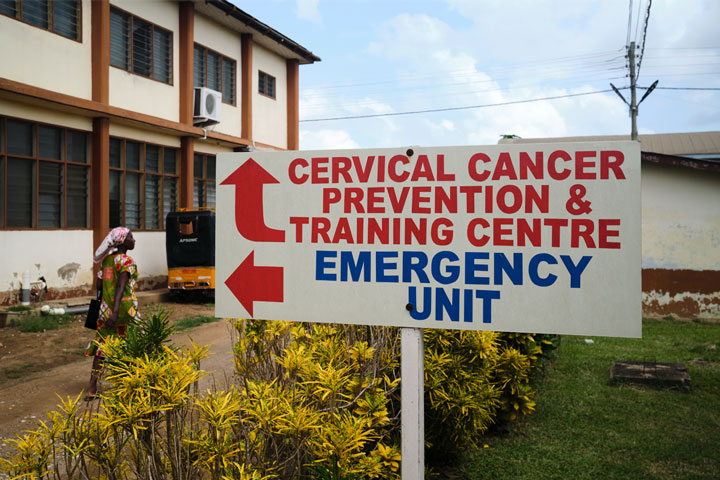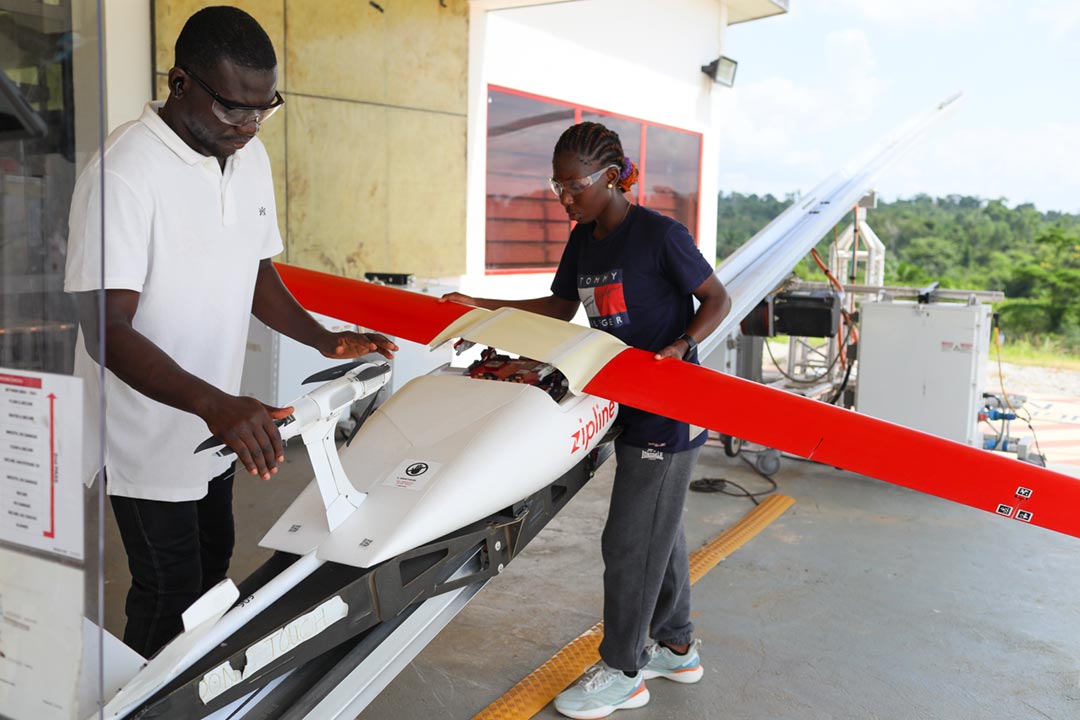Going door to door to protect Ghana’s most vulnerable
Ghana’s mop-up campaign aims to bring the public health system out into the homes and workplaces of at-risk populations. In Accra, VaccinesWork tagged along.
- 6 September 2023
- 6 min read
- by Nanama Boatemaa Acheampong
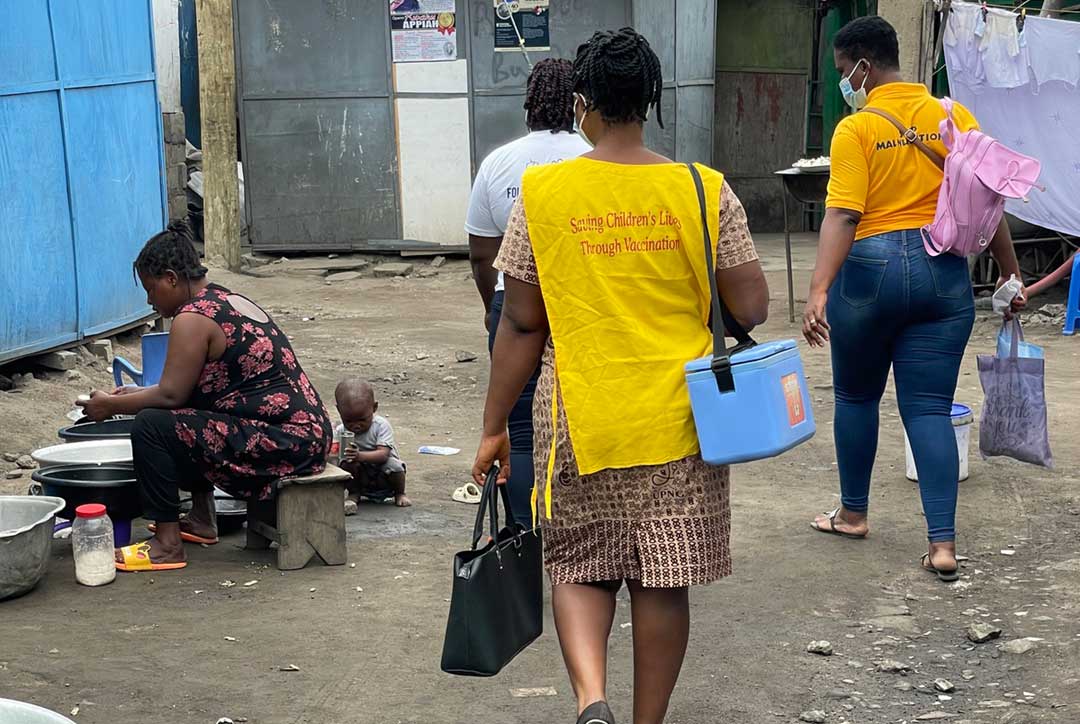
From 9–13 August 2023, Nurse Joana Odei of Accra and her team of four nurses carried out their second quarterly 'mop-up' vaccination campaign. VaccinesWork accompanied them to the Santana community in the Abeka sub-district of the Okaikwei North Municipal District – a densely populated area characterised by dirt roads, scattered debris, weathered wooden kiosks with tin roofing, and repurposed shipping containers.
"Looking through one person's window often unveils [the interior of] another's dwelling. The landscape is marked by compound houses accommodating multiple families," says Odei, a public health nurse and the sub-municipal head of the Abeka sub-district. Mop-ups zero in on zones of low coverage, and tightly clustered settlements like Santana are especially important to defend against epidemic disease.
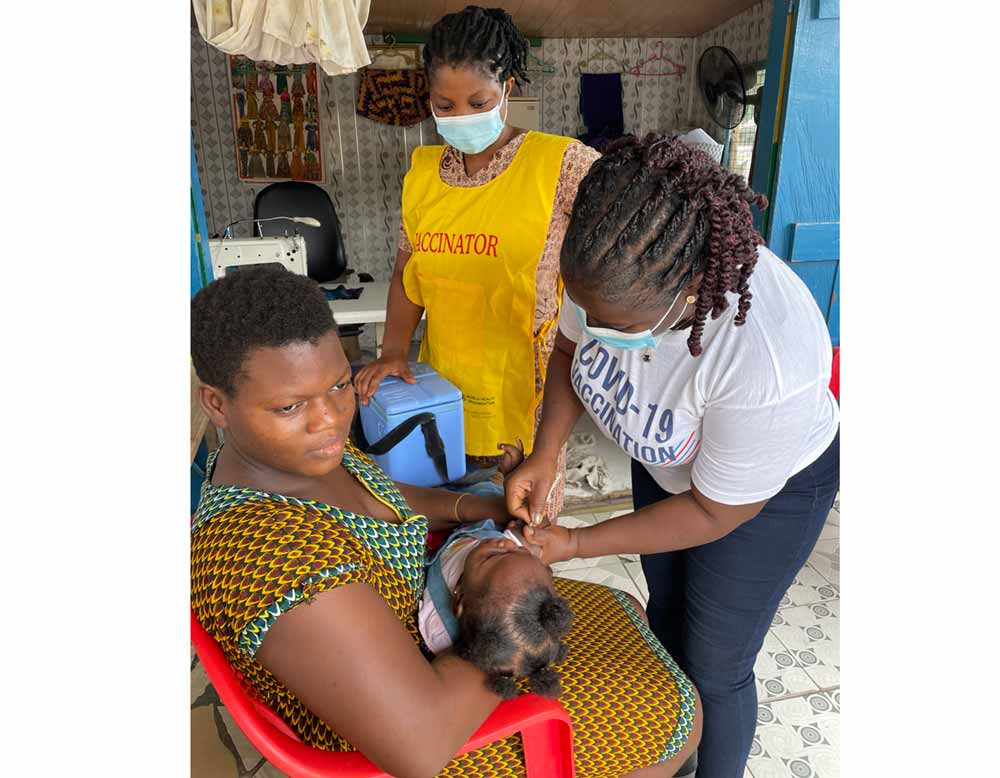
Credit: Nanama Boatemaa Acheampong
Near an abandoned train track, inside a shipping container that now functions as a small sewing workshop, Mary, an apprentice tailor, sits with her baby, Yvonne, on her lap. Nurse Dora Boakye reviews Yvonne's immunisation card and discovers that the one-year-old missed two vital vaccines – measles, and yellow fever – which she should have received at nine months, leaving her at risk of two deadly epidemic illnesses. Mary cites her busy schedule for missing clinic visits, but the nurse stresses the importance of regular check-ups for her baby's wellbeing.
Mary soothes her crying baby while Boakye administers the measles vaccine to Yvonne's left arm. She adjusts Yvonne's position to expose the right arm for Nurse Joana Odei to administer the yellow fever vaccine.
"A successful mop-up day takes various forms," explains Odei. "Discovering previously missed children constitutes a victory. Similarly, combing through a community and finding all mothers are up-to-date on their children's immunisations indicates effective education efforts. On the other hand, a subpar mop-up day may involve willing mothers but limited vaccine dosages, resulting in missed opportunities. Fortunately, we currently possess all required antigens, so shortages are not a concern."
In a nearby compound, two men sit across from each other, cleaning meat on a low wooden table. Odei attempts to persuade them about the importance of the COVID-19 vaccine. Despite initial resistance, she adopts a more authoritative tone to capture their attention. Another nurse inspects their children's vaccination cards and notes that one card is missing its front page, while another is damp and the writing is smudged.
"Before the mop-up drive, we conduct community entry exercises to establish rapport. Friendly interaction is crucial; otherwise, they might feign busyness to avoid engagement. Once they know us, they become receptive and often point us to other mothers with small children. New communities take time to accept us."
– Nurse Janet Nektiah
Still, it's only the paper documents that are in poor condition – the children are found to be up to date. Before moving on to the next compound, Nurse Janet Nketiah provides them each with a vitamin A supplement.
Typically, mop-up campaigns like this one run for five days, including weekends. The day begins at 08:00, with the team in the field and ready to engage with the communities. By 16:00, their tasks are usually completed, although they might wrap up earlier, around noon, when conditions are scorching.
Have you read?
Nurse Janet Nketiah, a community health nurse with 12 years of experience, says, "The first time I participated in a mop-up was in 2012. I wasn't anxious due to our approach. Before the mop-up drive, we conduct community entry exercises to establish rapport. Friendly interaction is crucial; otherwise, they might feign busyness to avoid engagement. Once they know us, they become receptive and often point us to other mothers with small children. New communities take time to accept us."
Nketiah continues, "Nurse Joana's support is invaluable. She ensures we have the necessary logistics and information. She's always in the field with us, ensuring we cover all ground. She's a great leader."
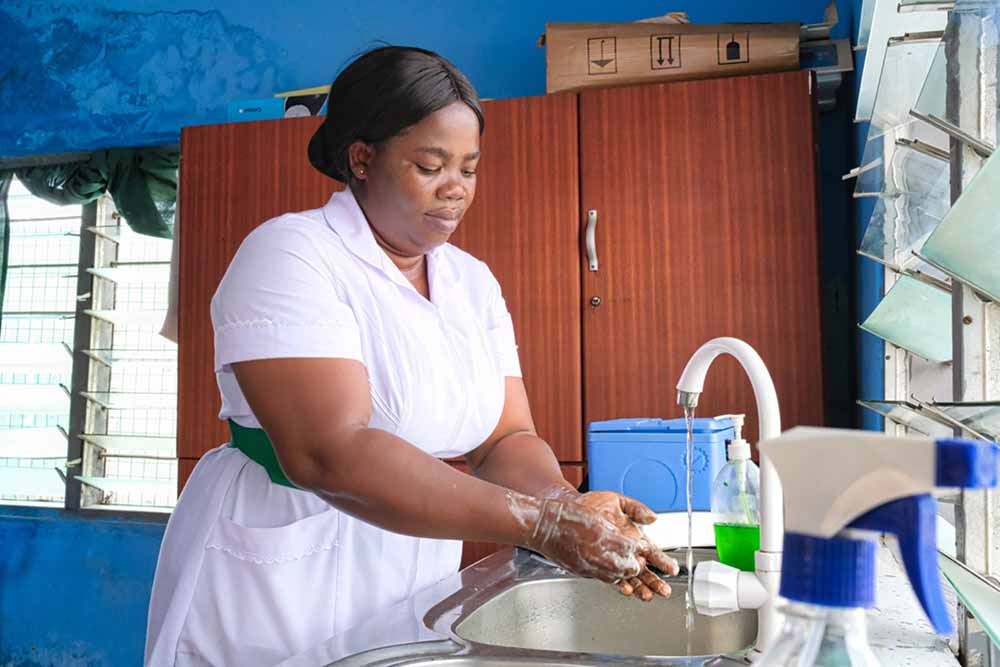
Credit: Rodney Quarcoo
Mothers in the Santana area are primarily market vendors or food kiosk proprietors, selling items like rice and banku, a Ghanaian dish made from fermented corn and cassava dough. As the nurses navigate from kiosk to shipping container, they make it a point to stop by groups of unaccompanied children playing on streets and dirt-laden grounds.
"Our field experience gives us a profound understanding of our work."
– Nurse Dora Boakye
"We sometimes ask the children to present their immunisation cards for inspection, but they often don't know where their mothers have kept them. We note down households with young children so we can revisit them when parents are available. We also communicate with the mothers through their children and neighbours. We maintain a registration book to document our visits, those who denied us access, and the defaulters we need to follow up with," explains Boakye.
She adds, "The work is undeniably challenging."
Boakye, a community health nurse, is an integral part of the mop-up team. With two years of experience, she recalls her initial trepidation during her first mop-up in 2022.
She shares, "I was apprehensive about how it would unfold. Sometimes people shy away from us due to concerns about the injections we administer to their children. We end up covering a lot of ground by foot. Nevertheless, over time, we become more familiar to them, building trust and rapport.
"I remember one instance in this same area, just beyond that significant gutter, where a mother declined immunisation for her child, citing a history of elevated temperature after previous injections. We clarified that the injections prevent harmful diseases. Often, they assert that they never received injections during their own childhood, but we inform them that they likely did but don't recall. Our field experience gives us a profound understanding of our work."
"Our mop-ups target low-coverage areas, particularly densely populated and hard-to-reach regions. These campaigns enable us to reach every corner."
– Nurse Joana Odei
Some of the successes of the outreach days can function on a delay. Boakye explains: "Following our conversations in the field, some mothers come to the clinics for their children's immunisations once they've had time to process the information."
Each mop-up campaign works to tailored targets. Odei elaborates, "We collaborate with the districts to determine targets for each mop-up. This calculation considers the district's existing vaccine deficits per antigen. Additionally, we compile our own data through quarterly and half-yearly reports to gauge our contribution to missed coverage. At the end of each half-year, we evaluate our performance against district figures."
She adds, "In the past, mothers sought vaccines from other health centres due to shortages, creating an impression of incomplete coverage. However, our mop-ups target low-coverage areas, particularly densely populated and hard-to-reach regions. These campaigns enable us to reach every corner."
In the face of logistical hurdles and sporadic resistance, Odei and her team maintain their steadfast commitment. Each vaccinated child, each protected life, and each healthier community reinforces their determination to continue this crucial work. In a bustling city where lives are interconnected, their efforts stand as an example of how healthcare professionals can make a lasting impact by prioritising prevention and community engagement.
